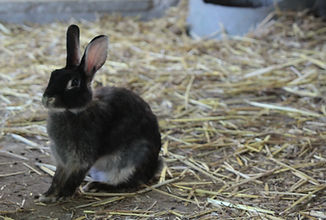103 Switchback Road Chirnside Park VIC 3116
03 9737 6366

Chirnside Park Veterinary Clinic
Dr Sae Inoue BVSc,
Dr Anton Gomez BVSc BSc & Associates




Rabbits
Vaccinations
Rabbits should receive a vaccine to protect against calici virus at 6-10 weeks, followed by a booster vaccine 4 weeks later. They should then be vaccinated yearly for life.
Unfortunately there is no vaccination for myxomatosis, which is a fatal viral disease prevalent in feral rabbit populations. The most effective protection against myxomatosis is placing fly wire or netting around the rabbit enclosure, as this disease is transmitted by mosquitoes.
Flea Treatment
Revolution Puppy & Kitten is safe for the use on rabbits and shold be given once a month to prevent fleas and mites.
Desexing
You can desex your rabbit at 4 months of age, or a minimum weight of 1kg.
Desexing rabbits is important for temperament, health and breeding management. Desexed rabbits make better pets as the are calmer and less aggressive. Desexing allows rabbits of different sexes to live together without uncontrolled litters. This is important as rabbits are social animals and prefer company. Female rabbits are also very susceptible to uterine cancer; desexing can avoid this risk.
Diet
-
Fresh grass hay every day – as much as the rabbit wants with some extra for bedding. Clean all of this out at least once a week.
-
Fresh grass as much as possible.
-
Fresh green leafy vegies – bok choy and other asian greens, endive, spinach, silverbeet, parsley, tops of carrots, celery (especially leaves) Other vegies can be OK but should be limited in quantity as can be high in digestible carbohydrates. Examples include brussell sprouts, brocolli, beans, carrots
-
Fruits should be limitted to only very small amounts as treats only.
-
ALL GRAIN MIXES AND MOST PELLETS ARE DETRIMENTAL TO A RABBIT'S HEALTH. Pellets from the supermarket are far too high in digestible carbohydrates. The only pellet brand we recommend is Vetafarm.
Reasons for this diet:
The rabbit digestive tract is designed to process grass, which is high in indigestible carbohydrates (cellulose). These carbohydrates pass through the small intestine and into the hindgut of the rabbit where healthy bacteria break them down into digestible forms. The products of this bacterial digestion are concentrated into balls called “caecotrophs” that are excreted and then re-ingested by the rabbit so that the nutrients can be absorbed by the small intestine. Owners usually never see these soft caecotroph pellets because rabbits pass them in the evening or early morning and consume them immediately. The hard dark pellets that rabbits pass during the day are the final result of this second digestion.
Food high in digestible carbohydrates (grains, fruits, sugars) can severely derrange the bacterial levels in the hindgut of rabbits. These foods promote unhealthy bacteria that can overgrow and produce toxins absorbed by the blood stream. In severe cases this can be fatal. They can also cause overly soft caecotrophs that stick and collect around the anus of the rabbit. This promotes skin bacterial infections and is highly attractive to flies. Soluble carbohydrates are absorbed quickly by the small intestine and contribute to obesity in rabbits.
Food highs in digestible carbohydrates can also cause poor dentition in rabbits. These foods are soft and do not require much chewing. The teeth of a rabbit, that grow continuously throughout their life, need to be regularly worn down to prevent excessive length. Overgrown teeth can damage the cheeks and tongue, lead to tooth root abscesses, and ultimately prevent the rabbit from eating.
Tips for a healthy rabbit: Follow the diet above. If your rabbit is not eating this diet, don't make any sudden changes. Introduce the new foods and gradually reduce the old foods over a period of about 2 weeks. Any sudden change in diet can upset your bunny's gut. Always have fresh water available. If your rabbit ever stops eating or passing droppings for more than 24 hours, this is considered an emergency and they must be seen by a vet as soon as possible.
Try to allow your rabbit as much exercise outside the cage as possible – as long as they can't escape and are safe from predators. This helps to keep their muscles and bones strong, stimulates their gut and they love it! Thoroughly clean the cage weekly and have a mosquito prof cover.